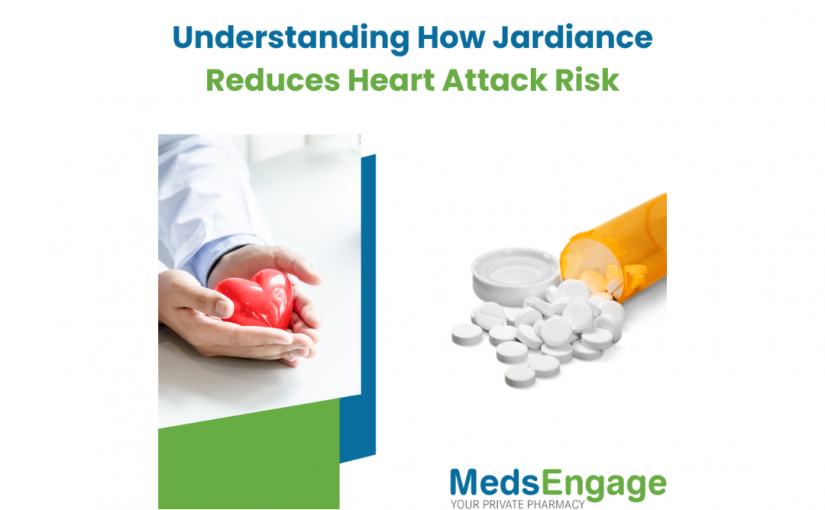Understanding how Jardiance reduces heart attack risk
Introduction:
- Introduction:
- What is Jardiance?
- Jardiance side effects:
- Understanding Heart Failure
- JARDIANCE FOR HEART FAILURE:
- How Jardiance Works
- Clinical Evidence Supporting Jardiance for Heart Failure
- Benefits of Jardiance Beyond Blood Sugar Control
- Patient Considerations
- Foods to Avoid while taking Jardiance:
- Conclusion:
In recent years, diabetes management has become increasingly sophisticated, with medications like Jardiance (empagliflozin) leading the way in not only controlling blood sugar levels but also in reducing cardiovascular risk. For those living with type 2 diabetes, understanding how Jardiance can lower the risk of heart attacks is crucial. In this blog, we’ll explore the mechanisms behind this benefit and the implications for overall health.
What is Jardiance?
Jardiance belongs to a class of medications known as SGLT2 inhibitors (sodium-glucose co-transporter 2 inhibitors). Originally developed to help manage blood sugar levels in patients with type 2 diabetes, it has gained attention for its cardiovascular benefits, particularly in reducing the risk of heart attacks and heart failure.
Jardiance side effects:
Here’s a list of potential side effects associated with Jardiance:
Common Side Effects
- Urinary Tract Infections (UTIs): Increased urination can lead to a higher risk of UTIs.
- Genital Yeast Infections: Both men and women may experience yeast infections due to increased glucose in the urine.
- Dehydration: Increased urination can lead to dehydration, causing symptoms like dry mouth, thirst, and dizziness.
- Low blood sugar (hypoglycemia): Particularly when used with other diabetes medications.
Less Common Side Effects
- Ketoacidosis: A rare but serious condition where the body produces high levels of ketones, leading to nausea, vomiting, abdominal pain, and confusion.
- Kidney Problems: Changes in kidney function can occur, particularly in those with existing kidney issues.
- Allergic Reactions: Rash, itching, or swelling may occur in rare cases.
Rare Side Effects
- Fournier’s Gangrene: A rare, serious bacterial infection of the genital region.
- Bone Fractures: There may be an increased risk of fractures in some patients.
Understanding Heart Failure
Heart failure occurs when the heart cannot pump effectively, leading to symptoms like fatigue, shortness of breath, and fluid retention.
It is often the result of various underlying conditions, including hypertension, coronary artery disease, and diabetes. Managing heart failure typically involves lifestyle changes, medications, and, in severe cases, surgical interventions.
JARDIANCE FOR HEART FAILURE:
The Connection Between Diabetes and Heart Failure
Individuals with diabetes are at a higher risk of developing heart failure. Elevated blood sugar levels can lead to damage in blood vessels and nerves, impacting the heart’s ability to function properly.
Thus, controlling diabetes is crucial not only for preventing complications but also for reducing the risk of heart failure.
How Jardiance Works
1. Mechanism of Action
Jardiance works by inhibiting the SGLT2 protein in the kidneys, which reduces glucose reabsorption and increases glucose excretion through urine. This action lowers blood sugar levels, but it also brings other benefits that are crucial for heart failure patients.
2. Diuretic Effect
One of the significant advantages of Jardiance is its diuretic effect. By promoting the excretion of excess glucose, Jardiance also helps the body eliminate excess sodium and fluid, reducing the volume of blood the heart must pump.
This can alleviate symptoms of heart failure, such as edema and shortness of breath.
3. Improved Cardiac Function
Clinical studies, including the EMPEROR-Reduced trial, have shown that Jardiance significantly reduces the risk of heart failure-related hospitalizations and improves overall cardiovascular outcomes.
This is particularly beneficial for patients with reduced ejection fraction heart failure, where the heart struggles to pump blood effectively.
4. Reduction in Heart Failure Symptoms
Patients taking Jardiance often report improvements in heart failure symptoms, including less fatigue and better exercise tolerance. This improvement is essential for enhancing the quality of life for those living with heart failure.
Clinical Evidence Supporting Jardiance for Heart Failure
Numerous clinical trials have demonstrated the benefits of Jardiance in heart failure management:
- EMPEROR-Reduced Trial: This landmark study highlighted that Jardiance significantly reduced the risk of heart failure hospitalization and cardiovascular death in patients with heart failure and reduced ejection fraction, irrespective of diabetes status.
- EMPEROR-Preserved Trial: This study focused on patients with preserved ejection fraction heart failure and found similar benefits, showcasing Jardiance’s effectiveness across various heart failure types.
Additional Studies and Findings
Beyond the EMPEROR trials, other research has reinforced Jardiance’s role in heart failure management:
- DAPA-HF Study: Although focused on another SGLT2 inhibitor, this study provided insight into the broader class of medications, showing that SGLT2 inhibitors can significantly improve outcomes in heart failure patients, including reduced hospitalizations and mortality rates.
- Meta-analyses: Recent meta-analyses have shown that SGLT2 inhibitors like Jardiance can lower heart failure hospitalization rates and improve quality of life, making them essential components of heart failure management strategies.
Benefits of Jardiance Beyond Blood Sugar Control
Jardiance’s cardiovascular benefits extend beyond its role in diabetes management. Here are some additional advantages:
- Cardiovascular Protection: Jardiance appears to offer direct cardiovascular protection, reducing inflammation and oxidative stress that can contribute to heart failure progression.
- Renal Protection: By improving kidney function, Jardiance helps manage the often comorbid conditions of diabetes and heart failure, addressing issues like fluid retention and hypertension.
- Better Patient Compliance: Many patients prefer once-daily medications like Jardiance due to ease of use, which can enhance adherence to treatment regimens.
Patient Considerations
While Jardiance presents many benefits, it’s essential for patients to consult healthcare providers before starting any new medication. Key considerations include:
- Monitoring Kidney Function: As with any medication, especially those affecting renal function, regular monitoring is essential to ensure the kidneys are responding well.
- Potential Side Effects: Although generally well-tolerated, some patients may experience side effects like urinary tract infections or genital yeast infections due to increased glucose in the urine.
- Individualized Treatment Plans: Each patient’s needs are unique. It’s crucial to create a treatment plan that considers all health factors, including other medications and underlying conditions.
Foods to Avoid while taking Jardiance:
1. High-Sugar Foods:
Sweets, sugary snacks, and desserts can raise blood sugar levels, counteracting the benefits of Jardiance.
2. Refined Carbohydrates:
White bread, pasta, and pastries can cause rapid spikes in blood sugar. Opt for whole grains instead.
3. High-Sodium Foods:
Processed foods, canned soups, and salty snacks can contribute to high blood pressure and fluid retention, which can be concerning for heart failure patients.
4. High-Fat Foods:
Foods high in saturated and trans fats (like fried foods and fatty cuts of meat) can negatively affect heart health.
5. Alcohol:
Drinking alcohol in moderation is generally okay, but excessive consumption can lead to low blood sugar or dehydration.
Conclusion:
Jardiance has emerged as a promising treatment option for heart failure, particularly for patients with diabetes.
Its ability to improve heart function, reduce fluid overload, and enhance overall cardiovascular health makes it a valuable addition to heart failure management.
Final Thoughts
If you or someone you know is managing heart failure, it’s important to consult with a healthcare provider about the potential benefits of Jardiance.
As research continues to unfold, medications like Jardiance offer hope for improved outcomes and quality of life for those affected by heart failure.
By prioritizing heart health and considering innovative treatment options, patients can take proactive steps toward a healthier future.
Embracing advancements in medical research and treatment options is vital for effectively managing heart failure, leading to longer, healthier lives for millions of patients.
FAQs
Yes, Jardiance (empagliflozin) can lead to weight loss in some individuals, particularly those with type 2 diabetes. As an SGLT2 inhibitor, Jardiance promotes the excretion of excess glucose through urine, which not only helps lower blood sugar levels but also reduces calorie intake from carbohydrates.
Jardiance (empagliflozin) is generally well-tolerated, but it can cause some side effects. Common side effects include urinary tract infections (UTIs) and genital yeast infections due to increased glucose in the urine. Patients may also experience dehydration, leading to symptoms like dry mouth, thirst, and dizziness. Low blood sugar (hypoglycemia) can occur, especially when used with other diabetes medications.
Taking Jardiance (empagliflozin) at night can lead to increased urination during the night, which may disrupt sleep due to the need to wake up to use the bathroom. While the medication is typically taken in the morning to align with daily routines and minimize nighttime bathroom trips, some patients may find it convenient to take it at night.
Jardiance (empagliflozin) is typically prescribed as a once-daily medication, with the standard doses being 10 mg or 25 mg. Taking Jardiance 25 mg twice a day is not generally recommended, as it could increase the risk of side effects without providing additional benefits in blood sugar control.
References:
- https://www.medicalnewstoday.com/articles/326007
- https://www.webmd.com/drugs/2/drug-166762/jardiance-oral/details
- https://www.webmd.com/heart-disease/heart-failure/jardiance-heart-failure
- https://www.nps.org.au/radar/articles/empagliflozin-jardiance-for-heart-failure-with-reduced-ejection-fraction-lvef-40
- https://www.boehringer-ingelheim.com/us/us-fda-approves-jardiancer-empagliflozin-treat-adults-living-heart-failure-reduced-ejection




